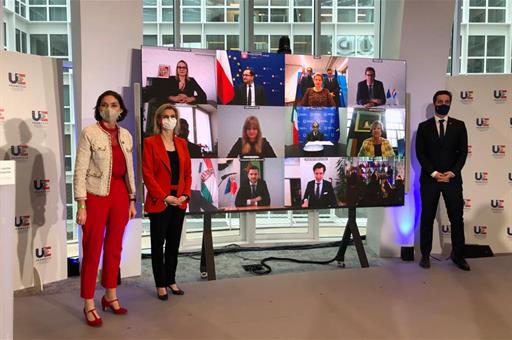Ministerial conference on the health industry
Spain joins the launch of the Important Project of Common European Interest (IPCEI) on Health
News - 2022.3.3
The Minister for Industry, Trade and Tourism, Reyes Maroto, today attended a ministerial conference on the health industry organised by the French Presidency of the Council of the European Union (EU) in Paris, where she confirmed that Spain will participate in the Important Project of Common European Interest (IPCEI) on health. A total of 14 countries participate in the IPCEI on Health, but it is open to new states to join.
"The COVID-19 crisis has revealed the fragility of global value chains and the need to strengthen our strategic autonomy in key sectors such as health. In this context, the IPCEI on Health, in which Spain will participate, will strengthen the EU's resilience and strategic autonomy in the area of health. A project that will help to provide us with a coordinated strategy at an EU level and will stimulate innovation and access to healthcare for the population," explained Reyes Maroto.
In her speech, the Minister stressed that "health is a priority for the Government of Spain in our recovery agenda and we have presented a strategic project for economic recovery and transformation (PERTE) that will mobilise public and private sector investment of 1.469 billion euros between 2021 and 2023. Our priority is to invest in the development, digitalisation and modernisation of industrial capacity and to facilitate the orientation of production chains towards diagnostic, therapeutic and rehabilitative innovation with high added value for people and administrations, expanding our industrial autonomy".
A Manifesto supporting the IPCEI for Health was signed during the ministerial conference, which reflects the ambition of this project. According to the signed document, the project will focus on three main objectives:
- It will provide an important contribution to the European Health Union, to the New Industrial Strategy for Europe and its update, and to their respective objectives.
- It will contribute to the first roll out of innovative and sustainable industrial production processes, which would be impossible without European support.
- It will promote cutting-edge, quality and accessible services.
The IPCEI would take the form of two waves: The first would cover three market segments, such as innovative and sustainable production technologies and processes for medicines; support for R&D to address antimicrobial resistance and rare diseases; and the development of cell and gene therapies. The second wave, according to the manifesto, would address digital health, MedTech and medical devices.
The IPCEI for Health joins three others in which Spain already participates: renewable hydrogen, microprocessors and batteries.
The objective of the IPCEI for Green Hydrogen is to develop the green hydrogen value chain in the decarbonisation of society, acting in relevant sectors such as mobility, residential and industrial.
This IPCEI for microprocessors aims to strengthen the European electronics industry, focusing on the design ecosystem, supply chain capabilities and early industrial deployment of advanced semiconductor technologies, including scaling up towards leading-edge process technologies for processor chips.
The IPCEI for batteries covers the entire value chain, from the extraction of raw materials, the design and manufacture of battery cells, to recycling and disposal in a circular economy, with a particular focus on sustainability.





